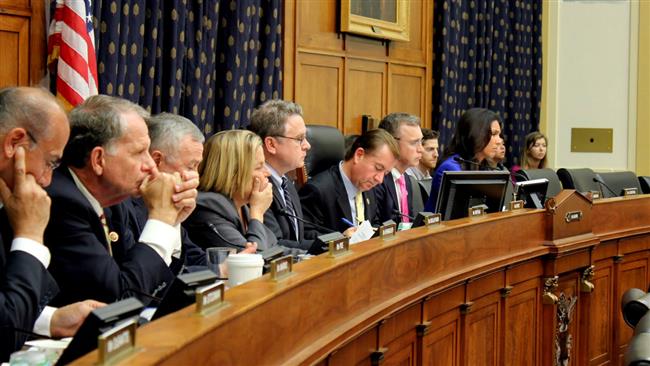Republican members of a US congressional panel have passed legislation that could undermine the nuclear agreement with Iran, setting up a potential showdown with Democrats and the White House over one of President Barack Obama’s signature foreign policy initiatives.
The Republican-led House of Representatives Foreign Affairs Committee approved the bill by a voice vote, which will then be considered by the full House next week.
The “Iran Terror Finance Transparency Act” would give Congress more oversight of the Iran agreement announced in July.
The JCPOA, reached between Iran and six world powers in the Austrian capital of Vienna on July 14, 2015, puts limits on Iran’s nuclear activities in exchange for the removal of all economic and financial bans against the Islamic Republic related to its nuclear program.
Opponents of the measure say it is an attempt by Republicans to violate terms of the nuclear deal with new legislation because they could not gather enough votes to scuttle it last year.
Republicans say the measure is to put pressure on Iran over its ballistic missile program and its support for groups fighting Israel in the Middle East.
Several Foreign Affairs committee Democrats, including some who opposed the nuclear deal last summer, vehemently objected to the Iran oversight measure.
“I believe it doesn’t serve any purpose to have bills like this that are designed to kill the deal,” said US Representative Eliot Engel, the top Democrat on the Foreign Affairs Committee.
“I don’t want to vote 62 or 63 times on killing the Iran agreement,” he said, in a reference to congressional Republicans’ dozens of votes seeking to repeal Obama’s healthcare reform law.
Lifting Iran sanctions ‘days away‘, says Kerry
US Secretary of State John Kerry said Thursday the implementation of the Iran nuclear agreement may be only “days away,” as the Islamic Republic is meeting its commitments.
Kerry told reporters at the State Department in Washington, DC, he had spoken to his Iranian counterpart, Foreign Minister Mohammad JavadZarif, who promised Tehran would live up to its promises made under the nuclear accord.
The JCPOA puts limits on Iran’s nuclear activities in exchange for the removal of all economic and financial bans against the Islamic Republic related to its nuclear program.
The United States would be ready to begin lifting its sanctions against Tehran, he added.
Last July, Iran and the P5+1 group of world powers – the US, Britain, France, Russia, China, and Germany – concluded talks on Iran’s nuclear energy program in Vienna.
Under the agreement, Iran has been recognized by the United Nations as a nuclear power and will continue its uranium enrichment program, but some restrictions will be placed on Iran’s nuclear program in exchange for the removal of sanctions.
Iran to switch from gas to power exports
In another development, as Iran is preparing for the removal of sanctions and the openings that it will create in various sectors, fresh debates are emerging in the country over the need to devise more efficient energy policies – what is expected to help the country’s economic growth.
Kamal Kharrazi, a former foreign minister and the head of the External Relations Council of Iran (ERCI), told an expert panel in Tehran on Friday that the country will need to give more weight to exporting electricity produced from natural gas rather than the gas, itself.
Kharrazi said electricity will have a greater added value over natural gas, suggesting that exporting electricity will lead to larger returns to Iran in terms of economic gains.
He further said that Iran’s gas exports are currently at lower levels, adding that this is because Iran is production of the strategic fuel is low.
Kharrazi said Iran should purchase the natural gas supplies of other countries including Turkmenistan and re-export them. This, he emphasized, is a policy that will bring Iran major economic and strategic gains in the long term.
Iran is the leading producer of electricity in the Middle East and 15th top producer in the world. The country currently exports electricity to Turkey, Armenia, Turkmenistan, Azerbaijan (including the Nakhchivan Autonomous Republic), Pakistan, Afghanistan and Iraq.
Iran’s Energy Ministry announced in November that the country will be able to import the technology to transform conventional power plants to combined-cycle plants that consume natural gas to produce electricity after the removal of the sanctions.
PRESS T.V
R.S

